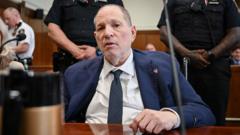A New York judge has declared a mistrial on a rape charge against Harvey Weinstein after a juror expressed fear of continuing deliberations amid tensions in the jury room, complicating his ongoing legal challenges stemming from previous convictions.
Mistrial Declared in Harvey Weinstein's Rape Case Following Juror Dispute

Mistrial Declared in Harvey Weinstein's Rape Case Following Juror Dispute
Tensions among jurors lead to a mistrial on the rape charge against Harvey Weinstein, who was previously convicted of sexual assault but faces ongoing legal battles.
A New York judge has declared a mistrial on a rape charge in the ongoing trial of Harvey Weinstein, following a dramatic escalation of tensions among jurors. The key issue arose when one juror refused to return to the deliberation room for the final charge related to the alleged 2013 assault on actress Jessica Mann.
This mistrial comes after a previous ruling last year that overturned Weinstein’s earlier conviction for sex crimes, leading to renewed charges last September. In the current case, a jury composed of seven women and five men deliberated for six days before the individual juror opted out of further discussions on the charge of rape, which had been at the center of the trial.
Prior to the mistrial, the deliberations had already been fraught with controversy. The jury foreperson had expressed concerns to the judge regarding “attacks” among jurors and attempts to sway each other's opinions. One alarming report mentioned threats that escalated into comments suggesting physical encounters outside the courtroom, prompting Judge Curtis Farber to intervene.
On the day of the mistrial declaration, the foreperson cited fears of yelling and confrontation as reasons for not wanting to return to the jury room, which led Judge Farber to announce that a mistrial would indeed be declared for this charge. "Sometimes jury deliberations become heated," the judge stated, acknowledging the unique challenges the jury faced during their discussions.
This trial stems from allegations made by three women, including actress Jessica Mann, who testified that Weinstein exploited his influential position in the entertainment industry to perpetrate sexual abuse. In a notable outcome, the jury found Weinstein guilty of the sexual assault charge related to former production assistant Miriam Haley but acquitted him concerning Polish model Kaja Sokola.
As it stands, this mistrial adds to the growing list of legal battles Weinstein faces, including a 16-year sentence from a prior conviction related to similar charges in Los Angeles. The continuing complexities of this high-profile case shed light on troubling patterns of behavior within the industry and the evolving discussions surrounding consent and accountability in the wake of the #MeToo movement.



















